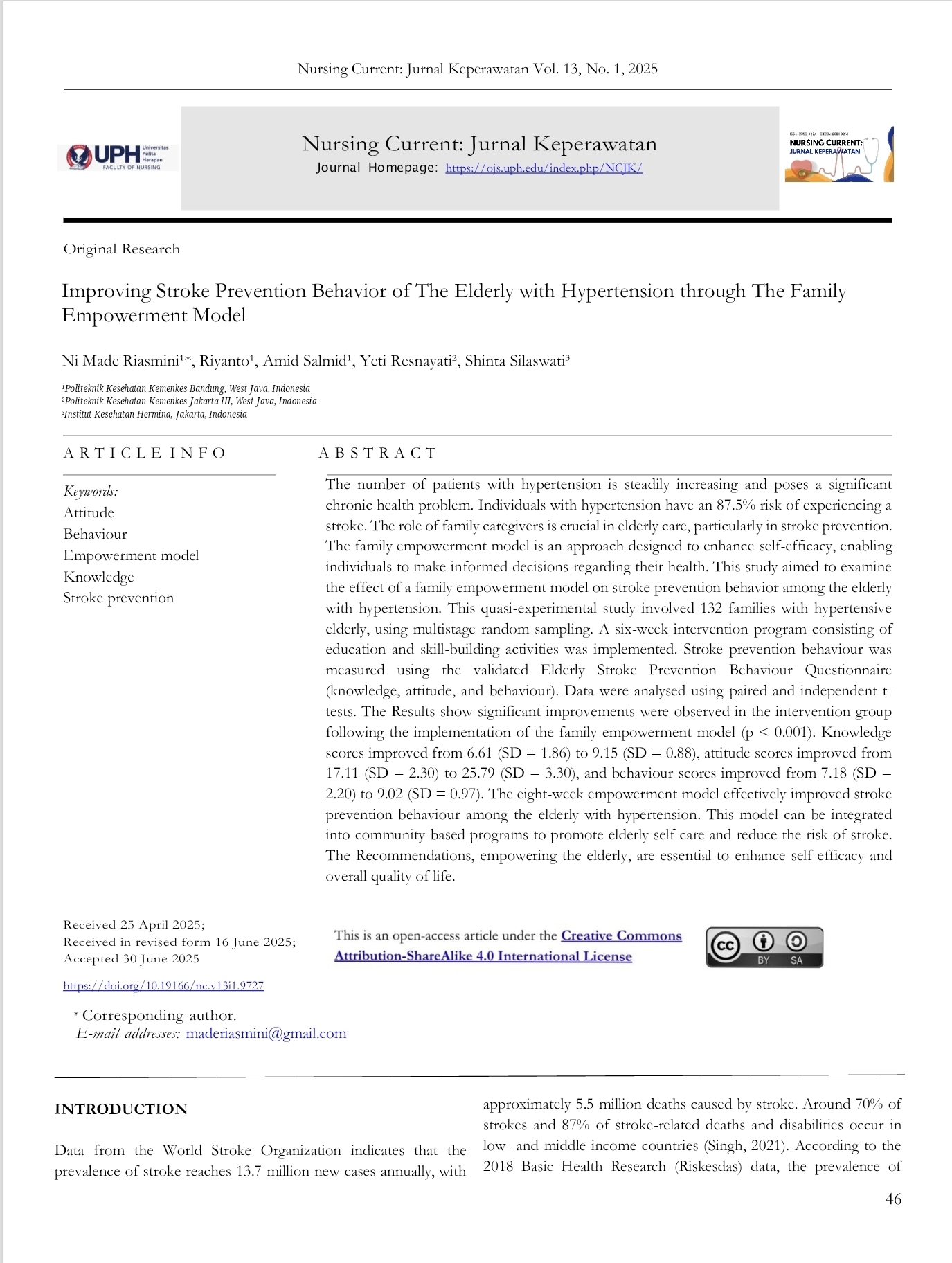PENINGKATAN PERILAKU PENCEGAHAN STROKE PADA LANSIA MELALUI PENGEMBANGAN MODEL PEMBERDAYAAN KELUARGA DAN LANSIA
DOI:
https://doi.org/10.19166/nc.v13i1.9727Kata Kunci:
empowerment model, knowledge, behavior, stroke prevention, attitudeAbstrak
Introduction: The number of patients with hypertension is steadily increasing and poses a significant chronic health problem. Individuals with hypertension have an 87.5% risk of experiencing a stroke. The role of family as caregivers is crucial in elderly care, particularly in stroke prevention. The family empowerment model is an approach designed to enhance self-potential, enabling individuals to make informed decisions regarding their own health. This study aimed to examine the effect of a family empowerment model on stroke prevention behavior among the elderly with hypertension. Methods: This quasi-experimental study involved 132 families with hypertensive elderly, using multistage random sampling. A six-week intervention program consisting of education and skill-building activities was implemented. Stroke prevention behaviour was measured using the validated Elderly Stroke Prevention Behaviour Questionnaire (knowledge, attitude and behaviour). Data were analysed using paired and independent t-tests. Results: Significant improvements were observed in the intervention group following the implementation of the family empowerment model (p < 0.001). Knowledge scores improved from 6.61 (SD = 1.86) to 9.15 (SD = 0.88), attitude scores improved from 17.11 (SD = 2.30) to 25.79 (SD = 3.30), and behaviour scores improved from 7.18 (SD = 2.20) to 9.02 (SD = 0.97). Conclusion: The eight-week empowerment model effectively improved stroke prevention behaviour among the elderly with hypertension This model can be integrated into community-based programs to promote elderly self-care and reduce the risk of stroke. Recommendations: Empowering the elderly is essential to enhance self-efficacy and overall quality of life.
Referensi
Ambarika, R., & Anggraini, N.A. (2022). Family Support for Prevention of Recurrent Stroke Events for Stroke Patients. Journal of Global Research in Public Health. Vol. 7, No 1, June 2022, pp. 8-16, ISSN: 2528-066X (Print), 2599-2880 (Online).
Bakri, A., Irwandy, F., & Linggi, E. B. (2020). Pengaruh Pendidikan Kesehatan Tentang Perawatan Pasien Stroke di Rumah Terhadap Tingkat Pengetahuan Keluarga. Jurnal Ilmiah Kesehatan Sandi Husada, Vol 11, No, 1, Juni 2020, pp;372-378, p-ISSN: 2354-6093 dan e-ISSN: 2654-4563, DOI: 10.35816/jiskh.v10i2.299,https://akper-sandikarsa.e-journal.id/JIKSH.
Boonyathee, S., Seangpraw, K., Ong Artborirak, P, Auttama, N, Tonchoy, P, Kantow, S, et al. (2021) Effects of A Social Support Family Caregiver Training Program on Changing Blood Pressure and Lipid Levels Among Elderly At Risk of Hypertension In A Northern Thai community. PLoS ONE 16(11): e0259697. https://doi.org/10.1371/ journal.pone.025969
Caro, C. C., et al., (2018). Burden And Quality of Life of Family Caregivers of Stroke Patients. Occupational Therapy in Health Care, 32(2), pp. 154-71. [DOI:10.1080/07380577.2018.1449046].
Dewi, N.L.P.T., & Wati, N.M.N. (2022). Hubungan Tingkat Pengetahuan Keluarga dengan Efikasi Diri Pasien
Pasca Stroke dalam Mencegah Serangan Berulang. Jurnal Akademika Baiturrahim Jambi (JABJ), September 2022, 11(2):203-213 (online). http://jab.stikba.ac.id/index.php/jab
DOI : 10.36565/jab.v11i2.512
Dongdong Li, et.al. (2025). Knowledge, attitude, and practice of stroke patients' family members towards stroke rehabilitation: A cross-sectional study. Journal of Stroke and Cerebrovascular Diseases. Volume 34, Issue 2, February 2025, 108177. https://doi.org/10.1016/j.jstrokecerebrovasdis.2024.108177
Dziesetuo, et.al. (2024). Effectiveness of Stroke Prevention Education amongst Family Members of Hypertensive Patients. Indian Journal of Continuing Nursing Education 25(1):p 51-55, Jan–Jun 2024. | DOI: 10.4103/ijcn.ijcn_43_23.
Hosseini F., Pashaeypoor Sh., Poortaghi S., Sharifi F., & Poorcheraghi H. (2023). The Effect of Family Empowerment on Preventive Lifestyle Of Cardiovascular Disease Risk Factors In Middle-Aged Women During The Covid-19 Pandemic: A Randomized Clinical Trial. Iranian Journal of Health Education & Health Promotion., 11(1), 5-19. (Spring 2023); Doi: 10.52547/ijhehp.11.1.5.
Husnaniyah, D., Hidayatin, T., & Handayani, E. J. (2021). Perilaku Pencegahan Stroke PadaPenderita Hipertensi di Wilayah Kerja Puskesmas Jatibarang Indramayu. Medika Cendikia, 8(1), 1–52. https://doi.org/https://doi.org/10.33482/medik a.v8i1.13.
Izadi-Avanji, F. S., et al., 2020. The Effect of a Family-centered Empowerment Model on the Quality of Life of Patients With Stroke. Journal of Client-Centered Nursing Care, 6(1), pp. 13-22. https://doi.org/10.32598/JCCNC.6.1.293.4
Kementerian Kesehatan RI. (2019). Laporan Nasional RISKESDAS 2018. Badan Penelitian dan Pengembangan Kesehatan, Jakarta.
Kementerian Kesehatan RI. (2023). Pedoman Pengendalian Hipertensi di Fasilitas Kesehatan Tingkat Pertama 2024. Jakarta
Owolabi MO., Thrift AG., Mahal A., Ishida M., Martins S., Johnson WD., et al. (2022). Primary stroke prevention worldwide: translating evidence into action. Lancet Public Health. 2022:e74-85, doi: 10.1016/S2468-2667(21)00230-9.
Parellangi et. Al. (2023). Adaptive Family-Based Stroke Prevention in Communities: A Systematic Review. Journal of Pharmaceutical Negative Results. Volume 14, Issue 1, 2023. DOI: 10.47750/pnr.2023.14.01.013
Pedersen, et.al (2020). Effect of Self-Management Support for Elderly People Post-Stroke: A Systematic Review. Geriatrics 2020, 5, 38; doi:10.3390/geriatrics5020038. www.mdpi.com/journal/geriatrics.
Rahmawati, L. (2022). Pengalaman Keluarga dalam Merawat Lansia Pasca Stroke di Indramayu. Afiasi: Jurnal Kesehatan Masyarakat, Vol. 7, No. 2 Hal. 299-307. ISSN Online : 2622-3392. http://afiasi.unwir.ac.id.
Safitri, W., & Agustin, W. R. (2020). Pengetahuan dengan Motivasi Pencegahan Stroke pada Penderita Hipertensi. Adi Husada Nursing Journal, 6(1), 45. https://doi.org/10.37036/ahnj.v6i1.160.
Sari, L.M., Murni, L., & Nurmala, I. (2023). Hubungan Pengetahuan Keluarga Tentang Deteksi Dini Tanda Dan Gejala Stroke Dengan Tingkat Keparahan Stroke. Jurnal Kesehatan Tambusai. Volume 4, Nomor 4, Desember 2023. ISSN : 2774-5848 (Online).
Septianingrum, Y. (2024). Factors Associated With Family Caregiver Readiness to Care for Post‑Stroke Patients After Hospital Discharge. Discover Social Science and Health (2024) 4:4.| https://doi.org/10.1007/s44155-024-00064-6.
Setiawati, E., Lipoeto, N.I., Syafrita, Y., & Bachtiar, A. (2022). Development of the Erdanela model for stroke prevention in the elderly: Effectiveness Test. Journal of Research in Science Education, November 2022, Volume 8, Issue 5, 2556-2562,
http://jppipa.unram.ac.id/index.php/jppipa/index
Singh, P.K. (2021). World Stroke Day. WHO Regional Director for South-East Asia, 20 Oktober 2021.
Sofiana,L. & Rahmawati, D.D. (2019). Hypertension and Diabetes Mellitus Increase the Risk of Stroke. Jurnal Kesehatan Masyarakat, 15 (2) (2019) 147-152. e-ISSN 2355-3596, http://journal.unnes.ac.id/nju/index.php/kemas.
Susanti, E., Manurung, A., & Pranata. L. (2018). Hubungan Antara Dukungan Keluarga Dengan Harga Diri Lansia Di Kelurahan Kebun Bunga Kecamatan Sukarami Palembang. Jurnal Ilmiah Bakti Farmasi, 2018, III (1), hal. 17-26.

Unduhan
Diterbitkan
Cara Mengutip
Terbitan
Bagian
Lisensi
Hak Cipta (c) 2025 Ni Made Riasmini, Yeti Resnayati, Shinta Silaswati, Riyanto Riyanto, Amid Salmid

Artikel ini berlisensiCreative Commons Attribution-ShareAlike 4.0 International License.
Authors who publish with this journal agree to the following terms:
1) Authors retain copyright and grant the journal right of first publication with the work simultaneously licensed under a Creative Commons Attribution License (CC-BY-SA 4.0) that allows others to share the work with an acknowledgement of the work's authorship and initial publication in this journal.
2) Authors are able to enter into separate, additional contractual arrangements for the non-exclusive distribution of the journal's published version of the work (e.g., post it to an institutional repository or publish it in a book), with an acknowledgement of its initial publication in this journal.
3) Authors are permitted and encouraged to post their work online (e.g., in institutional repositories or on their website). The final published PDF should be used and bibliographic details that credit the publication in this journal should be included.

This work is licensed under a Creative Commons Attribution-ShareAlike 4.0 International License.





